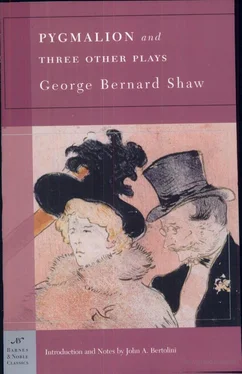RIDGEON What is it?
WALPOLE Blood-poisoning.
RIDGEON Blood-poisoning! Impossible.
WALPOLE I tell you, blood-poisoning. Ninety-five per cent of the human race suffer from chronic blood-poisoning, and die of it. It’s as simple as A. B. C. Your nuciform sac is full of decaying matter — undigested food and waste products — rank ptomaines. [151] Poisonous bacteria that can cause food poisoning.
Now you take my advice, Ridgeon. Let me cut it out for you.You’ll be another man afterwards.
SIR PATRICK Dont you like him as he is?
WALPOLE No I dont. I dont like any man who hasnt a healthy circulation. I tell you this: in an intelligently governed country people wouldnt be allowed to go about with nuciform sacs, making themselves centres of infection. The operation ought to be compulsory: it’s ten times more important than vaccination.
SIR PATRICK Have you had your own sac removed, may I ask?
WALPOLE [triumphantly] I havnt got one. Look at me! Ive no symptoms. I’m as sound as a bell. About five per cent of the population havnt got any; and I’m one of the five per cent. I’ll give you an instance. You know Mrs Jack Foljambe: the smart Mrs Foljambe? I operated at Easter on her sister-in-law, Lady Gorran, and found she had the biggest sac I ever saw: it held about two ounces. Well, Mrs. Foljambe had the right spirit — the genuine hygienic instinct. She couldnt stand her sister-in-law being a clean, sound woman, and she simply a whited sepulchre. [152] Appearing moral, but being immoral (see the Bible, Matthew 23:27, KJV).
So she insisted on my operating on her, too. And by George, sir, she hadnt any sac at all. Not a trace! Not a rudiment! ! I was so taken aback — so interested, that I forgot to take the sponges out, and was stitching them up inside her when the nurse missed them. Somehow, I’d made sure she’d have an exceptionally large one. [He sits down on the couch, squaring his shoulders and shooting his hands out of his cuffs as he sets his knuckles akimbo].
EMMY [ looking in] Sir Ralph Bloomfleld Bonington.
A long and expectant pause follows this announcement. All look to the door; but there is no SIR RALPH.
RIDGEON [ at last ] Where is he?
EMMY [looking back] Drat him, I thought he was following me. He’s stayed down to talk to that lady.
RIDGEON [ exploding ] I told you to tell that lady — [ EMMY vanishes] .
WALPOLE [jumping up again ] Oh, by the way, Ridgeon, that reminds me. Ive been talking to that poor girl. It’s her husband, band; and she thinks it’s a case of consumption: the usual wrong diagnosis: these damned general practitioners ought never to be allowed to touch a patient except under the orders of a consultant. [153] Specialist.
She’s been describing his symptoms to me; and the case is as plain as a pikestaff: bad blood-poisoning. Now she’s poor. She cant afford to have him operated on. Well, you send him to me: I’ll do it for nothing. Theres room for him in my nursing home. I’ll put him straight, and feed him up and make her happy. I like making people happy. [He goes to the chair near the window].
EMMY [looking in] Here he is.
SIR RALPH BLOOMFIELD BONINGTON wafts himself into the room. He is a tall man, with a head like a tall and slender egg. He has been in his time a slender man; but now, in his sixth decade, his waistcoat has filled out somewhat. His fair eyebrows arch goodnaturedly and uncritically. He has a most musical voice; his speech is a perpetual anthem; and he never tires of the sound of it. He radiates an enormous self-satiifaction, cheering, reassuring, healing by the mere incompatibility of disease or anxiety with his welcome presence. Even broken bones, it is said, have been known to unite at the sound of his voice: he is a born healer, as independent if mere treatment and skill as any Christian scientist. When he expands into oratory or scientific exposition, he is as energetic as WALPOLE; but it is with a bland, voluminous, atmospheric energy, which envelops its subject and its audience, and makes interruption or inattention impossible, and imposes veneration and credulity on all but the strongest minds. He is known in the medical world as B. B.; and the envy roused by his success in practice is softened by the conviction that he is, scientifically considered, a colossal humbug: the fact being that, though he knows just as much (and just as little) as his contemporaries, the qualifications that pass muster in common men reveal their weakness when hung on his egregious personality.
B. B. Aha! Sir Colenso. Sir Colenso, eh? Welcome to the order of knighthood.
RIDGEON [shaking hands] Thank you, B. B.
B . B. What! Sir Patrick! And how are we to-day? A little chilly? a little stiff? but hale and still the cleverest of us all. [SIR PATRICK grunts ] . What! Walpole! the absent-minded beggar: {41} 41 7 (p. 267) “Walpole! the absent-minded beggar”: The reference is to English writer Rudyard Kipling’s 1899 poem “The Absent-minded Beggar.” The accent in the delivery of B.B.’s line falls on “absent-minded”; “beggar” is used here figuratively to mean “fellow,” not an actual “beggar.”
eh?
WALPOLE What does that mean?
B. B. Have you forgotten the lovely opera singer I sent you to have that growth taken off her vocal cords?
WALPOLE [springing to his feet ] Great heavens, man, you dont mean to say you sent her for a throat operation!
B. B. [ archly ] Aha! Ha ha! Aha! [ trilling like a lark as he shakes his finger at WALPOLE ] . You removed her nuciform sac. Well, well! force of habit! force of habit! Never mind, ne-e-e-ver mind. She got back her voice after it, and thinks you the greatest surgeon alive; and so you are, so you are, so you are.
WALPOLE [in a tragic whisper, intensely serious ] Blood-poisoning. I see. I see. [He sits down again ] .
SIR PATRICK And how is a certain distinguished family getting on under your care, Sir Ralph?
B. B. Our friend Ridgeon will be gratified to hear that I have tried his opsonin treatment on little Prince Henry with complete success.
RIDGEON [startled and anxious ] But how — — —
B. B. [ continuing ] I suspected typhoid: the head gardener’s boy had it; so I just called at St Anne’s one day and got a tube of your very excellent serum. You were out, unfortunately.
RIDGEON I hope they explained to you carefully — — —
B. B. [ waving away the absurd suggestion] Lord bless you, my dear fellow, I didnt need any explanations. I’d left my wife in the carriage at the door; and I’d no time to be taught my business by your young chaps. I know all about it. Ive handled these anti-toxins ever since they first came out.
RIDGEON But theyre not anti-toxins; and theyre dangerous unless you use them at the right time.
B. B. Of course they are. Everything is dangerous unless you take it at the right time. An apple at breakfast does you good: an apple at bedtime upsets you for a week. There are only two rules for anti-toxins. First, dont be afraid of them: second, inject them a quarter of an hour before meals, three times a day.
RIDGE ON [ appalled ] Great heavens, B. B., no, no, no.
B. B. [ sweeping on irresistibly ] Yes, yes, yes, Colly. The proof of the pudding is in the eating, you know. It was an immense success. It acted like magic on the little prince. Up went his temperature; off to bed I packed him; and in a week he was all right again, and absolutely immune from typhoid for the rest of his life. The family were very nice about it: their gratitude was quite touching; but I said they owed it all to you, Ridgeon; and I am glad to think that your knighthood is the result.
Читать дальше












